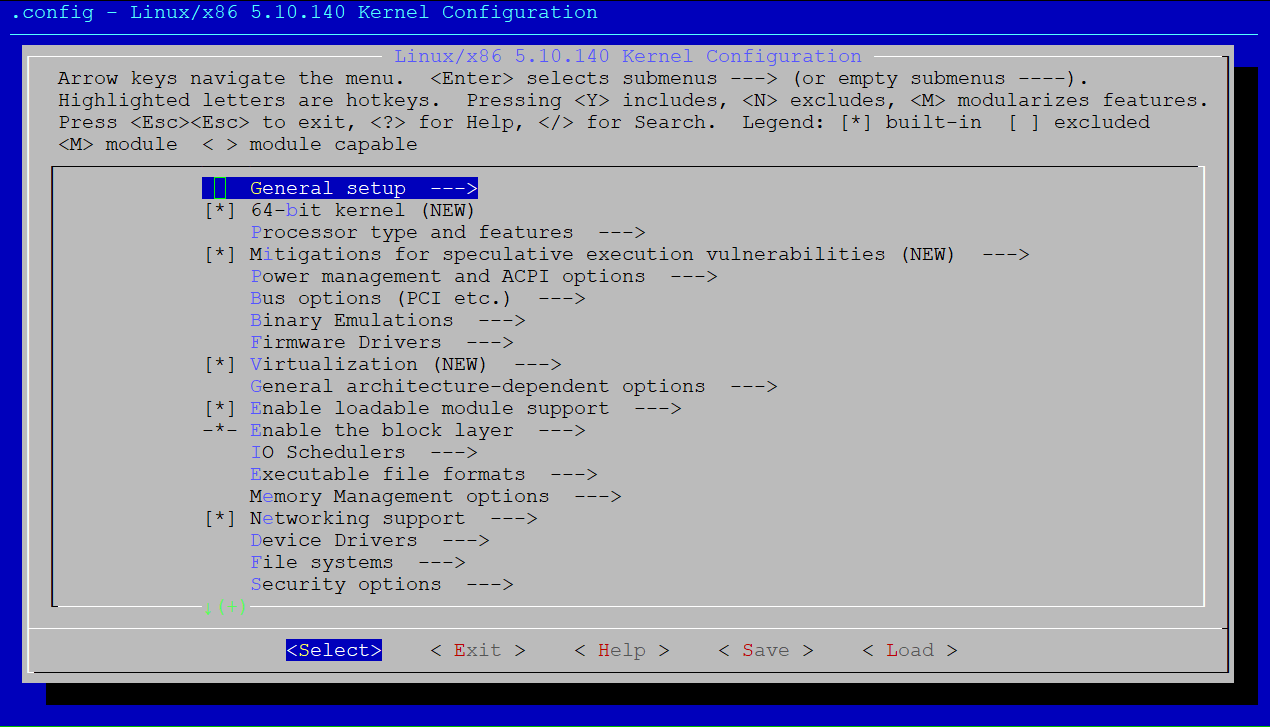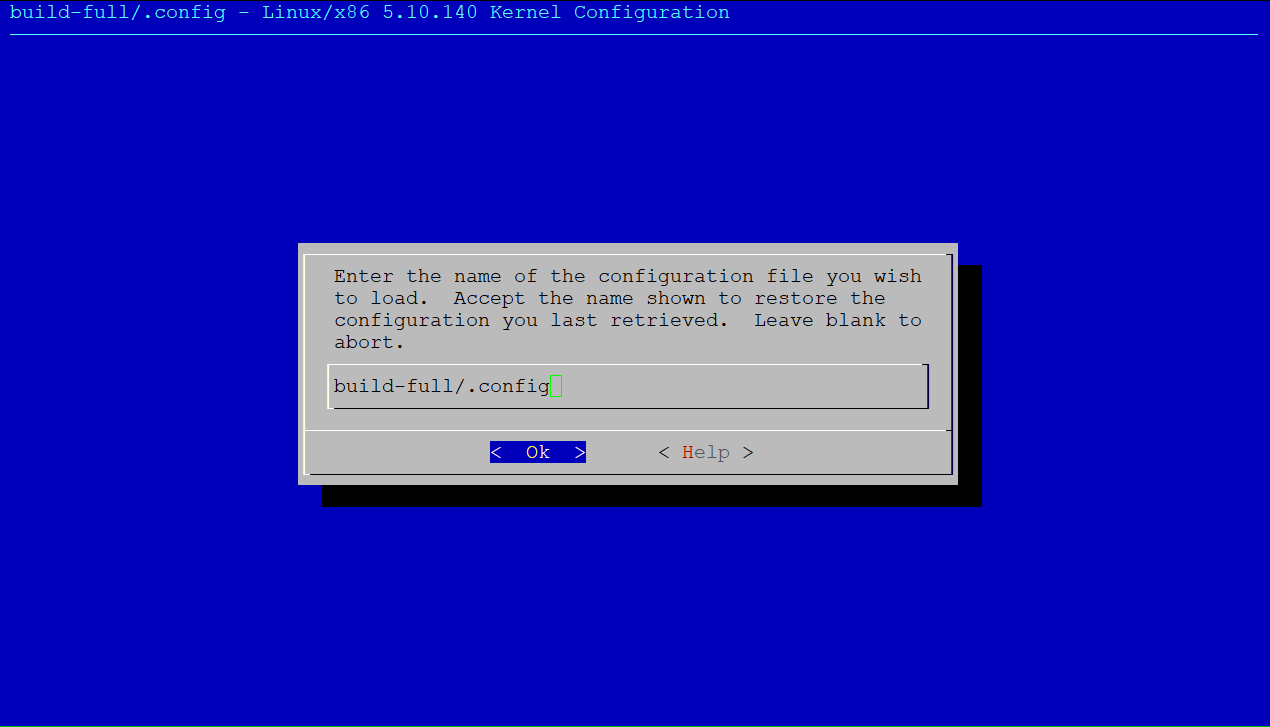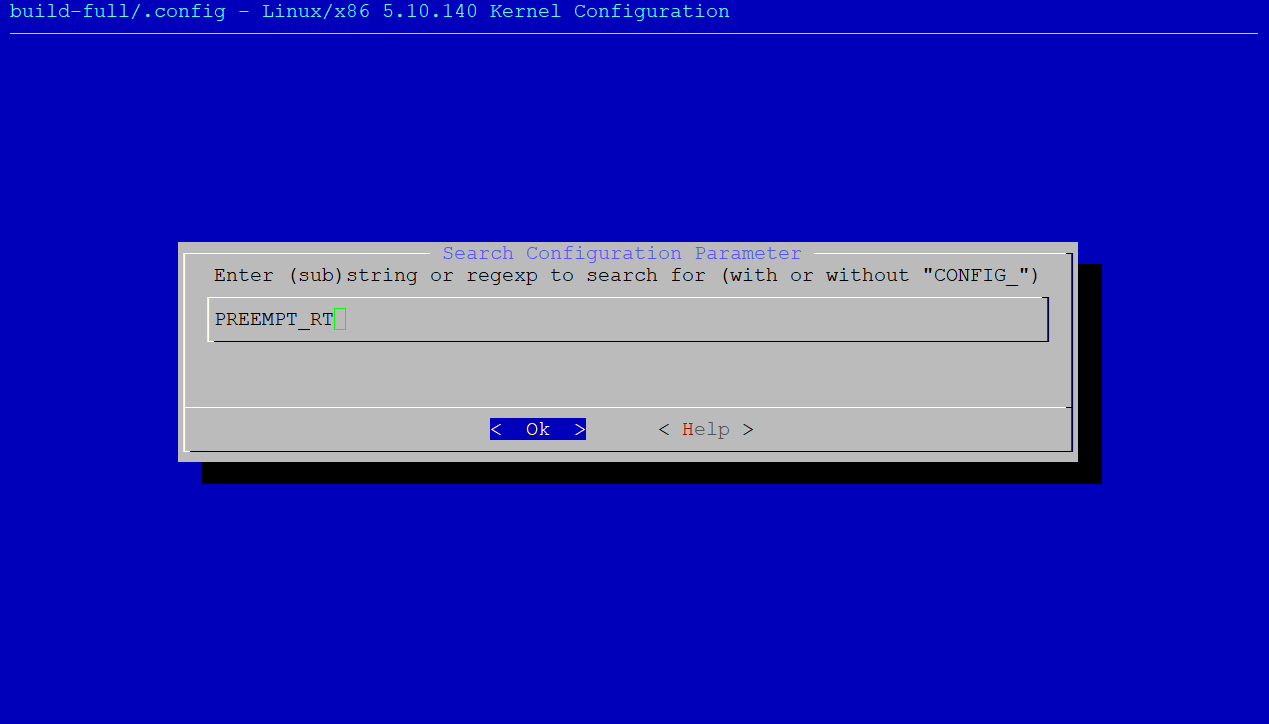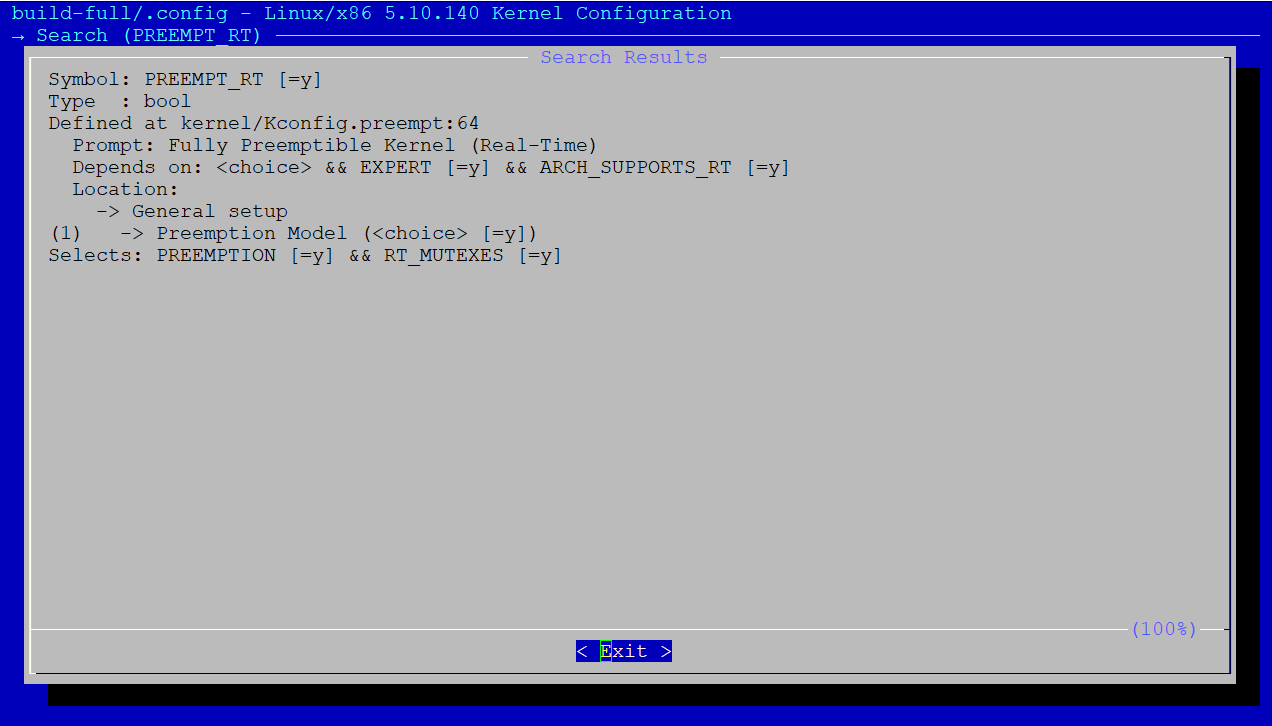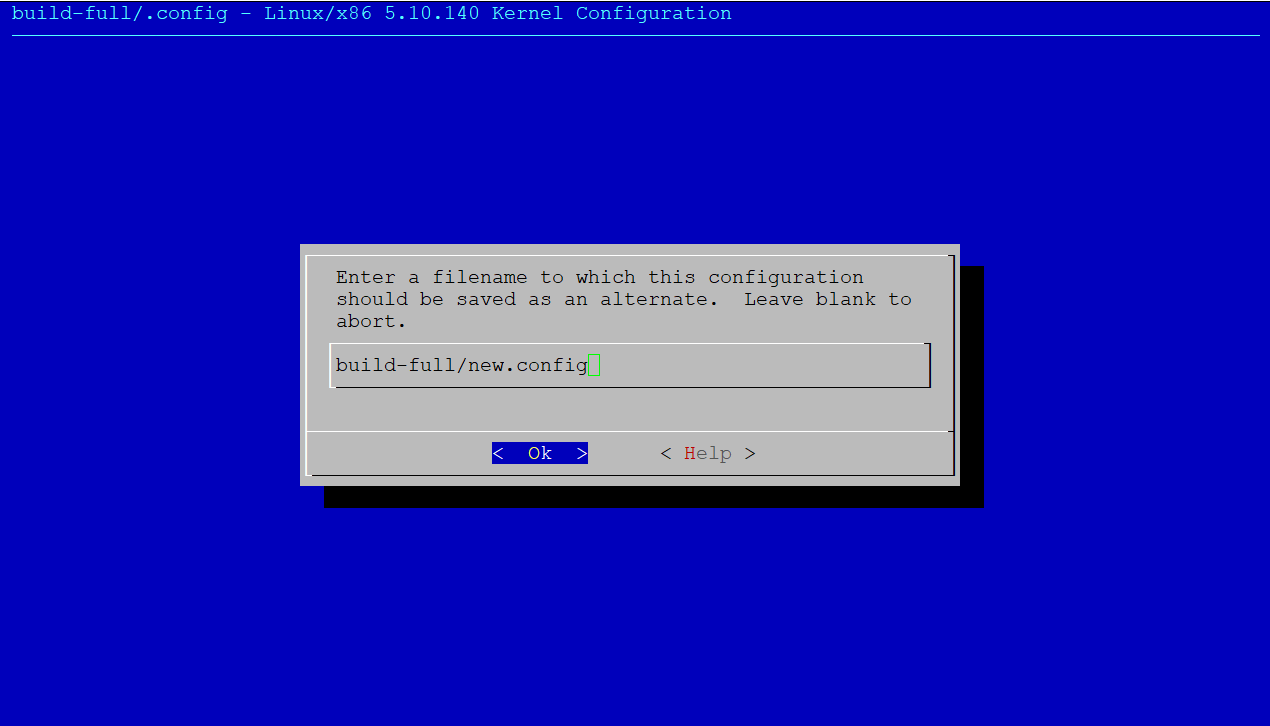Configure and Build Linux Kernel¶
This guide presents two methods of configuring and building the Linux kernel. Both methods will produce identical results, but they differ in the build environment used. See the table below for a description of each method.
Section |
Description |
|---|---|
This method will configure and build the Linux kernel using the ECI Build Engine. Choose this method if you would like to build Deb packages which can be installed onto a target system. |
|
This section will configure and build the Linux kernel directly from the local filesystem. Choose this method if you would like to develop directly on the target system. |
Configure and Build Linux Kernel from ECI Build Engine¶
This section will explain the procedure to configure the Linux kernel and build it using the ECI Build Engine. It is recommended to read ECI Development Practices to gain a better understanding of the basic development principles.
Step 1: Environment Prerequisites¶
In this step, you will set up your build environment.
Setup the Build System, if not done already.
Identify the Linux kernel that you want to configure. ECI offers a few options for various distributions. Refer to ECI Linux Intel LTS Kernel for a list of available kernels and their respective distribution. In this section,
linux-image-intel-rtfor Debianbullseyedistribution will be used. If you are using a different kernel, you will need to modify the example commands accordingly.Locate the pre-built Linux kernel Deb package:
$ find ./targets/packages/ -name linux-image-intel*.deb
The
findcommand should display a list of available Linux kernel Deb packages:./targets/packages/bullseye/eci-bullseye/pool/main/l/linux-intel-acrn-sos/linux-image-intel-acrn-sos_5.10.115-bullseye-2_amd64.deb ./targets/packages/bullseye/eci-bullseye/pool/main/l/linux-intel-rt/linux-image-intel-rt_5.10.115-rt67-bullseye-2_amd64.deb ./targets/packages/bullseye/eci-bullseye/pool/main/l/linux-intel-xenomai/linux-image-intel-xenomai_5.10.100-bullseye-2_amd64.deb ./targets/packages/jammy/eci-jammy/pool/main/l/linux-intel-acrn-sos/linux-image-intel-acrn-sos_5.15.36-jammy-2_amd64.deb ./targets/packages/jammy/eci-jammy/pool/main/l/linux-intel-rt/linux-image-intel-rt_5.15.36-rt41-jammy-2_amd64.deb
Export the path of the desired Linux kernel Deb package, so that you can reference it in the later commands:
$ export PACKAGE=./targets/packages/bullseye/eci-bullseye/pool/main/l/linux-intel-rt/linux-image-intel-rt_5.10.115-rt67-bullseye-2_amd64.deb
Extract the Linux kernel Deb package to obtain the Linux kernel default configuration:
$ TDIR=$(mktemp -d -p .) $ ar x ${PACKAGE} --output ${TDIR} $ tar --directory=${TDIR} -xf ${TDIR}/data.tar* $ cp ${TDIR}/boot/config-* . && rm -r ${TDIR}
Now, you will find a file named
config-*in the directory:$ ls config-* config-5.10.115-rt67-intel-ese-standard-lts-rt+
Locate the existing Linux kernel default configuration, backup the existing Linux kernel default configuration, and copy the new one:
$ RDIR=./targets/layers/meta-tgr/meta-eci-isar/recipes-kernel/linux/files $ DEFAULT=$(find ${RDIR} -name *_intel_defconfig) $ mv ${DEFAULT} ${RDIR}/$(basename ${DEFAULT})_backup $ cp config-* ${DEFAULT}
You will find two
*intel_defconfig*files in the${RDIR}directory:$ ls ${RDIR}/*_intel_defconfig* ./targets/layers/meta-tgr/meta-eci-isar/recipes-kernel/linux/files/amd64_5.10_intel_defconfig ./targets/layers/meta-tgr/meta-eci-isar/recipes-kernel/linux/files/amd64_5.10_intel_defconfig_backup
-
Note: You do not have to append any meta-layer YAML
meta-vendor-application.ymlto build the Linux kernel. The example usesbullseyetargets, but usebookwormorjammytargets if you are building a Linux kernel for the Debian or Canonical® Ubuntu® distribution respectively.
Step 3: Build Linux Kernel¶
In this step, you will build the Linux kernel Deb package.
Build the Linux kernel image. The build duration will vary depending on the system capabilities. Typically, the build will complete in about 20 minutes if the system meets the recommended system requirements.
$ bitbake ${RECIPE}
After the build completes, exit the
bitbakeenvironment using theexitcommand.$ exit
You will find the resulting Linux kernel Deb packages in the target APT repository located at
build/eci-packages-<distribution>/tmp/deploy/isar-apt. To find all the Linux kernel Deb packages, run the following command:$ sudo find build/eci-packages-*/tmp/deploy/isar-apt -name linux-image-*.deb
For example, the
linux-image-intel-rtDeb package forbullseye:build/eci-packages-bullseye/tmp/deploy/isar-apt/eci-bullseye-amd64/apt/eci-bullseye/pool/main/l/linux-intel-rt/linux-image-intel-rt_5.10.140-rt73-bullseye-4_amd64.debYou could install the Linux kernel Deb package onto the target system using the
dpkg -i <package.deb>command or you could privately host the ECI APT repository to install the Linux kernel Deb package using the APT package manager.
Configure and Build Linux Kernel on local filesystem¶
This section will explain the procedure to configure the Linux kernel and build it from a local filesystem using incremental kernel development principles.
Intel® Edge Controls for Industrial adopts the built-in IKPATCHSET_PROC principles designed by OSADL to facilitate easier maintenance and redistribution of Intel® LTS out-of-tree (OOT) Intel® Edge Controls for Industrial kernel patches.
Step 1: Local Environment Prerequisites¶
In this step, you will set up your Linux local build environment.
Install ECI Linux kernel, if not done already.
Identify the Linux kernel that you want to rebuild locally. ECI offers a few options for various distributions. Refer to ECI Linux Intel LTS Kernel for a list of available kernels and their respective distribution.
In this section,
linux-image-intel-rtfor Debianbullseyedistribution will be used as example. If you are using a different kernel, you will need to modify the example commands accordingly.Locate the Linux kernel images Deb package:
$ apt list | grep linux-image-intel*
The
grepcommand should display a list of available Linux kernel Deb packages:linux-image-intel-acrn-sos/unknown 5.10.179-bullseye-8 amd64 linux-image-intel-rt/unknown 5.10.179-rt87-bullseye-8 amd64 [installed] linux-image-intel-xenomai/unknown 5.10.179-bullseye-8 amd64
Install Linux kernel build essential Deb packages:
$ sudo apt install build-essential:amd64 bc kmod cpio libelf-dev libncurses-dev libssl-dev bison flex wget rsync quilt asciidoctor gcc-multilib libaudit-dev libbabeltrace-dev libdw-dev libiberty-dev libnewt-dev libnuma-dev libperl-dev libunwind-dev libopencsd-dev python3-dev python3-docutils zlib1g-dev libbpf-dev libcap-dev clang llvm libfl-dev pahole
Step 2: Download Linux Intel LTS tree¶
In this step, you will set download the Intel® LTS Linux tree at a specific tag.
Find the https://github.com/intel/linux-intel-lts tag of current a local Linux kernel image using /proc
$ tar zxf /proc/patchset.tar.gz baseversion && cat baseversion
The
catcommand should display the https://github.com/intel/linux-intel-lts tag Linux kernel Deb packages was built from:lts-v5.10.179-rt87-preempt-rt-230612T183703ZDownload Intel® LTS given reference archive and instantiate Linux source tree.
$ tar zxf /proc/patchset.tar.gz baseversion && cat baseversion $ major="$(cut -d- -f2 baseversion | cut -c2-)" $ urldir="https://github.com/intel/linux-intel-lts/archive/refs/tags" $ directory="linux-intel-lts-$(cat baseversion)" $ archive="$(cat baseversion).tar.gz" $ wget "${urldir}/${archive}"
Tip
If
wgetis unable to download the Linux Intel tree archive file, follow these troubleshooting tips:Make sure that the system has network connectivity.
Make sure that the ports
80and8080are not blocked by a firewall.Add proxy setting (if network traffic routes through a proxy server) on via command line parameter or into
~/.wgetrcconfig
$ wget -e use_proxy=yes -e http_proxy=http://<proxyurl>:<port> -e https_proxy=http://<proxyurl>:<port> "${urldir}/${archive}"
Step 3: Apply patch quilt from IKPATCHSET_PROC¶
In this step, you will apply Intel® LTS out-of-tree (OOT) Intel® Edge Controls for Industrial patches.
Find the https://github.com/intel/linux-intel-lts tag of current a local Linux kernel image using
/proc:$ tar zxf "${archive}" $ cd "${directory}" $ mkdir -p ./build-full $ tar zxf /proc/patchset.tar.gz && cat patches/series
The
catcommand should display the ordered patches which will be applied onto the https://github.com/intel/linux-intel-lts tagbaseversionsource tree. For example:tools-perf-version.patch tools-perf-install.patch 0001-edac-fix-hazardeous-ieh-nmi-registery.patch 0001-keylocker-fix-compile-when-CONFIG_ACPI_SLEEP-disable.patch 0001-GT-Frequency-Lock-Set-idle-Frequency.patch 0001-vfio-pci-Add-support-for-opregion-v2.1.patch 0002-vfio-pci-Add-OpRegion-2.0-Extended-VBT-support.patch 0003-vfio-pci-Add-IGD-stolen-memory-identical-mapping.patch 0001-osadl-Save-the-current-patchset-in-the-kernel.patch 0002-isar-adapt-ikpatchset-to-intel-lts-tag-base.patch 0001-igc-fix-missing-SPD-pins-and-PPS-when-ptm-is-disable.patch 0002-igc-add-CONFIG_IGC_TSN_TRACE-conditional-trace_print.patch 0001-ANDROID-trace-power-add-trace_clock_set_parent.patch 0002-ANDROID-trace-net-use-pK-for-kernel-pointers.patch 0003-ANDROID-trace-add-non-hierarchical-function_graph-op.patch 0004-xdp-Add-trace-events-in-XDP-transmit-path.patch 0005-xdp-extend-XDP_TX-trace-events-format.patch 0001-Changing-the-reference-value-from-100Mhz-to-200Mhz.patch 0001-porting-mcp251xfd-spi-driver-on-x86-platform.patch 0001-disable-loading-pnvm.patch
Apply patch quilt on Intel® LTS referenced Linux source tree:
$ quilt push -a
Step 5: Build and install local Linux kernel image¶
In this step, you will use the Linux toolchain to build and install Linux kernel images and modules.
Run a full build of the Linux kernel image and modules:
$ export ARCH=x86 $ export CROSS_COMPILE='x86_64-linux-gnu-' $ export O=$(pwd)'/build-full' $ make -j16 O=build-full DISALLOW_TRACE_PRINTK=1
make[1]: Entering directory '/home/eci-user/lts-v5.10.179-rt87-preempt-rt-230612T183703Z/build-full' SYNC include/config/auto.conf.cmd GEN Makefile GEN Makefile WRAP arch/x86/include/generated/uapi/asm/bpf_perf_event.h WRAP arch/x86/include/generated/uapi/asm/errno.h WRAP arch/x86/include/generated/uapi/asm/fcntl.h WRAP arch/x86/include/generated/uapi/asm/ioctl.h WRAP arch/x86/include/generated/uapi/asm/ioctls.h WRAP arch/x86/include/generated/uapi/asm/ipcbuf.h WRAP arch/x86/include/generated/uapi/asm/param.h WRAP arch/x86/include/generated/uapi/asm/poll.h WRAP arch/x86/include/generated/uapi/asm/resource.h WRAP arch/x86/include/generated/uapi/asm/socket.h WRAP arch/x86/include/generated/uapi/asm/sockios.h WRAP arch/x86/include/generated/uapi/asm/termbits.h WRAP arch/x86/include/generated/uapi/asm/termios.h WRAP arch/x86/include/generated/uapi/asm/types.h UPD include/generated/uapi/linux/version.h UPD include/config/kernel.release WRAP arch/x86/include/generated/asm/early_ioremap.h WRAP arch/x86/include/generated/asm/export.h WRAP arch/x86/include/generated/asm/mcs_spinlock.h WRAP arch/x86/include/generated/asm/irq_regs.h WRAP arch/x86/include/generated/asm/kmap_size.h WRAP arch/x86/include/generated/asm/local64.h WRAP arch/x86/include/generated/asm/mm-arch-hooks.h WRAP arch/x86/include/generated/asm/mmiowb.h WRAP arch/x86/include/generated/asm/module.lds.h WRAP arch/x86/include/generated/asm/rwonce.h UPD include/generated/utsrelease.h DESCEND objtool HOSTCC scripts/extract-cert HOSTCC /home/eci-user/linux-intel-rt/build-full/tools/objtool/fixdep.o HOSTLD /home/eci-user/linux-intel-rt/build-full/tools/objtool/fixdep-in.o LINK /home/eci-user/linux-intel-rt/build-full/tools/objtool/fixdep CC scripts/mod/empty.o HOSTCC scripts/mod/mk_elfconfig CC scripts/mod/devicetable-offsets.s CC /home/eci-user/linux-intel-rt/build-full/tools/objtool/weak.o CC /home/eci-user/linux-intel-rt/build-full/tools/objtool/check.o CC /home/eci-user/linux-intel-rt/build-full/tools/objtool/special.o CC /home/eci-user/linux-intel-rt/build-full/tools/objtool/orc_gen.o CC /home/eci-user/linux-intel-rt/build-full/tools/objtool/orc_dump.o CC /home/eci-user/linux-intel-rt/build-full/tools/objtool/builtin-check.o CC /home/eci-user/linux-intel-rt/build-full/tools/objtool/builtin-orc.o CC /home/eci-user/linux-intel-rt/build-full/tools/objtool/exec-cmd.o MKDIR /home/eci-user/linux-intel-rt/build-full/tools/objtool/arch/x86/ CC /home/eci-user/linux-intel-rt/build-full/tools/objtool/elf.o CC /home/eci-user/linux-intel-rt/build-full/tools/objtool/help.o CC /home/eci-user/linux-intel-rt/build-full/tools/objtool/objtool.o MKDIR /home/eci-user/linux-intel-rt/build-full/tools/objtool/arch/x86/lib/ CC /home/eci-user/linux-intel-rt/build-full/tools/objtool/arch/x86/special.o CC /home/eci-user/linux-intel-rt/build-full/tools/objtool/libstring.o GEN /home/eci-user/linux-intel-rt/build-full/tools/objtool/arch/x86/lib/inat-tables.c CC /home/eci-user/linux-intel-rt/build-full/tools/objtool/libctype.o CC /home/eci-user/linux-intel-rt/build-full/tools/objtool/str_error_r.o UPD scripts/mod/devicetable-offsets.h MKELF scripts/mod/elfconfig.h HOSTCC scripts/mod/modpost.o HOSTCC scripts/mod/file2alias.o HOSTCC scripts/mod/sumversion.o ... LD [M] sound/soc/codecs/snd-soc-wm8750.ko LD [M] sound/soc/codecs/snd-soc-wm8753.ko LD [M] sound/soc/codecs/snd-soc-wm8770.ko LD [M] sound/soc/codecs/snd-soc-wm8776.ko LD [M] sound/soc/codecs/snd-soc-wm8804-i2c.ko LD [M] sound/soc/codecs/snd-soc-wm8804-spi.ko LD [M] sound/soc/codecs/snd-soc-wm8804.ko LD [M] sound/soc/codecs/snd-soc-wm8903.ko LD [M] sound/soc/codecs/snd-soc-wm8960.ko LD [M] sound/soc/codecs/snd-soc-wm8962.ko LD [M] sound/soc/codecs/snd-soc-wm8974.ko LD [M] sound/soc/codecs/snd-soc-wm8978.ko LD [M] sound/soc/codecs/snd-soc-wm8985.ko LD [M] sound/soc/generic/snd-soc-simple-card-utils.ko LD [M] sound/soc/generic/snd-soc-simple-card.ko LD [M] sound/soc/intel/atom/snd-soc-sst-atom-hifi2-platform.ko LD [M] sound/soc/intel/atom/sst/snd-intel-sst-acpi.ko LD [M] sound/soc/intel/atom/sst/snd-intel-sst-core.ko LD [M] sound/soc/intel/boards/snd-skl_nau88l25_max98357a.ko LD [M] sound/soc/intel/boards/snd-soc-intel-hda-dsp-common.ko LD [M] sound/soc/intel/boards/snd-soc-skl_nau88l25_ssm4567.ko LD [M] sound/soc/intel/boards/snd-soc-skl_rt286.ko LD [M] sound/soc/intel/boards/snd-soc-sst-bxt-da7219_max98357a.ko LD [M] sound/soc/intel/boards/snd-soc-sst-bxt-rt298.ko LD [M] sound/soc/intel/boards/snd-soc-sst-bytcr-rt5640.ko LD [M] sound/soc/intel/boards/snd-soc-sst-bytcr-rt5651.ko LD [M] sound/soc/intel/boards/snd-soc-sst-cht-bsw-max98090_ti.ko LD [M] sound/soc/intel/boards/snd-soc-sst-cht-bsw-rt5645.ko LD [M] sound/soc/intel/boards/snd-soc-sst-cht-bsw-rt5672.ko LD [M] sound/soc/intel/common/snd-soc-acpi-intel-match.ko LD [M] sound/soc/intel/common/snd-soc-sst-dsp.ko LD [M] sound/soc/intel/common/snd-soc-sst-ipc.ko LD [M] sound/soc/intel/skylake/snd-soc-skl.ko LD [M] sound/soc/snd-soc-acpi.ko LD [M] sound/soc/snd-soc-core.ko LD [M] sound/synth/emux/snd-emux-synth.ko LD [M] sound/synth/snd-util-mem.ko LD [M] sound/usb/hiface/snd-usb-hiface.ko LD [M] sound/usb/snd-usb-audio.ko LD [M] sound/usb/usx2y/snd-usb-us122l.ko LD [M] sound/usb/snd-usbmidi-lib.ko LD [M] sound/usb/usx2y/snd-usb-usx2y.ko LD [M] virt/lib/irqbypass.ko make[1]: Leaving directory '/home/eci-user/lts-v5.10.179-rt87-preempt-rt-230612T183703Z/build-full'
Install Linux bootable kernel image:
$ kimage="./build-full/$(make O=$(pwd)'/build-full' -s --no-print-directory image_name)" && echo $kimage $ krel="$(make O=$(pwd)'/build-full' -s --no-print-directory kernelrelease)" && echo $krel $ kimage_path="/boot/vmlinuz-${krel}" $ sudo install -m 755 -d $(dirname ${kimage_path}) $ sudo install -m 644 ${kimage} ${kimage_path}
Install Linux kernel configuration:
$ sudo install -m 644 $(pwd)/build-full/.config $(dirname ${kimage_path})/config-${krel} $ sudo install -m 644 $(pwd)/build-full/System.map $(dirname ${kimage_path})/System.map-${krel}
Install Linux kernel image debug symbols. Note: The locations will differ for the various Linux tools e.g. perf, kdump-tools, Systemtap …
$ sudo mkdir -p /usr/lib/debug/lib/modules/${krel}/ $ sudo install -m 644 $(pwd)/build-full/vmlinux /usr/lib/debug/lib/modules/${krel}/ $ sudo mkdir -p /usr/lib/debug/boot/ $ sudo ln -s ../lib/modules/${krel}/vmlinux /usr/lib/debug/boot/vmlinux-${krel} $ sudo ln -s lib/modules/${krel}/vmlinux /usr/lib/debug/vmlinux-${krel}
Install Linux kernel modules:
$ sudo mkdir -p /usr/lib/modules/${krel}/ $ sudo make O=$(pwd)'/build-full' INSTALL_MOD_PATH='/usr/lib/modules/'${krel} modules_install
Update the GRUB boot configuration:
$ sudo update-grub
Generating grub configuration file ... Found background image: /usr/share/images/desktop-base/desktop-grub.png Found linux image: /boot/vmlinuz-5.10.179-rt87-intel-ese-standard-lts-rt+ Found initrd image: /boot/initrd.img-5.10.179-rt87-intel-ese-standard-lts-rt+ Found linux image: /boot/vmlinuz-5.10.179-rt87-intel-ese-standard-lts-rt+ Found initrd image: /boot/initrd.img-5.10.179-rt87-intel-ese-standard-lts-rt+ Adding boot menu entry for UEFI Firmware Settings ...
